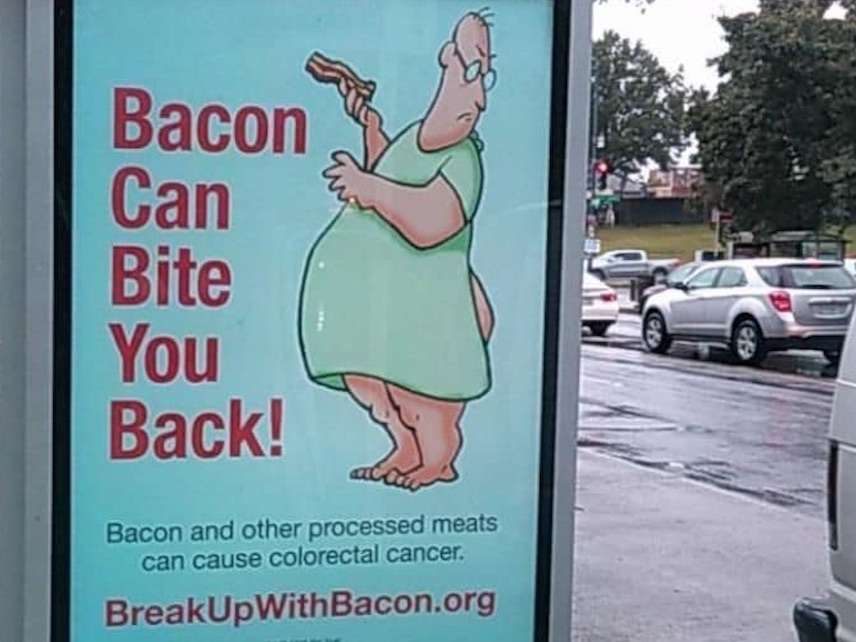Go Ahead and Ignore Those #BreakUpWithBacon Ads
Nutrition nannies launch new cancer scaremongering campaign.

The activist group Physicians Committee for Responsible Medicine is running an anti-bacon campaign in the District of Columbia. The campaign includes advertisements on TV and at bus stops throughout the city under the slogan #BreakUpWithBacon.
Neal Barnard, founder of the Physicians Committee group, said the leading cause of cancer deaths for men and women in the United States is lung cancer, largely attributable to tobacco, and the second leading cause is colorectal cancer, reports The Washington Post. "The message is, 'Bacon is the new tobacco,'" Barnard said. In support of this assertion, Barnard cites data from the International Agency for Research on Cancer that finds that eating 50 grams of processed meat daily, equivalent to about 4 strips of bacon, correlates with an 18 pecent increase in the risk of getting colorectal cancer.
Should you quit bacon? First, eating 50 grams daily amounts to a bit over 40 pounds of bacon annually. Keep in mind that only about 18 million Americans consumed more than 5 pounds of bacon annually in 2018.
Second, the lifetime risk of developing colorectal cancer in the U.S. is about 4.49 percent for men and 4.15 percent for women. Roughly calculated, an 18 percent increase means that the risk would rise to 5.3 percent for men and to 4.9 percent for women. In contrast, the lifetime risk of lung cancer among current male and female smokers is 17.2 and 11.6 percent, respectively, compared to the corresponding risks of male and female non-smokers at 1.3 and 1.4 percent. In other words, smoking boosts lung cancer risk by more than 1,000 percent compared to eating bacon, which increases the risk by 18 percent.
The far more effective way for a person to reduce the risk of getting and dying from colon cancer is to receive regular colonoscopies. For example, a recent study reports that colonoscopies help reduce the incidence of colorectal cancer by 89 percent.
I don't doubt the sincerity of the folks associated with the Physicians Committee for Responsible Medicine, but comparing the cancer risks of bacon consumption to those of smoking basically amounts to scaremongering.
Disclosure: A precancerous polyp was removed during my first colonoscopy in my early 50s. Two subsequent colonoscopies have found no additional polyps. I intend to continue eating the occasional strip of bacon and to submitting to colonoscopies every five years or so.


Show Comments (21)